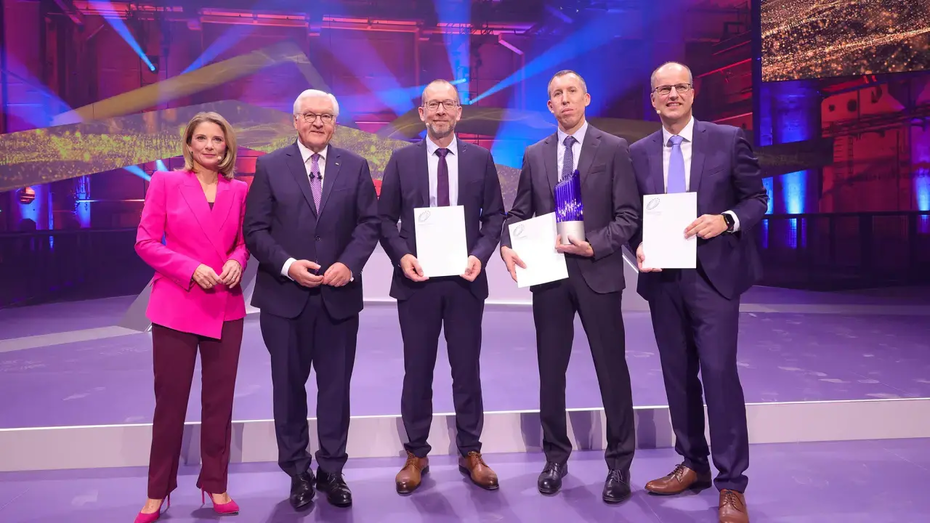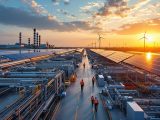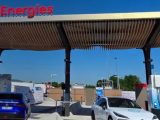
Bosch’s Fuel Cell Power Module Wins Deutscher Zukunftspreis for Zero-Emission Trucks
November 20, 2025It’s easy to think of those massive trucks rolling out of Europe’s ports as just hauling cargo, but there’s a bigger story under the hood: carbon emissions. Long-haul trucks shoulder more than a quarter of the EU’s road transport CO₂ footprint, making them one of the toughest sectors to decarbonize. In Berlin, Christoffer Uhr, Kai Weeber and Pierre Andrieu snagged the coveted Deutscher Zukunftspreis for their commercial-grade Fuel Cell Power Module, a breakthrough in hydrogen fuel cells and fuel cell technology that promises climate-neutral freight.
Since 2023, these modules have been rolling off the line at Bosch’s Stuttgart-Feuerbach plant and, more recently, in Chongqing, China. Think about it: a regular 40-ton truck cruising 1,000 km after just a 15-minute refill of green hydrogen. That’s made possible by intelligent digital twin monitoring and a featherlight build that’s roughly four tons lighter than most battery-electric setups. And get this—it went from concept to full-blown production in mere months, a lightning pace for the grueling world of heavy-duty transport.
A legacy of innovation
From its humble beginnings in 1886, Robert Bosch GmbH has blossomed into one of Europe’s engineering titans, spanning everything from automotive components and industrial tech to consumer gadgets and energy solutions. This isn’t their first rodeo with the Deutscher Zukunftspreis—they’ve won for breakthroughs in fuel injection, automotive sensors and laser tech. It’s that knack for turning lab ideas into real-world products that’s made the fast track to series production for their Fuel Cell Power Module feel almost inevitable, cementing Bosch’s status as a heavyweight in fuel cell technology and hydrogen-fueled mobility.
How it works
At its heart, the Fuel Cell Power Module is all about turning hydrogen and oxygen into electricity via a stack of proton exchange membrane (PEM) cells. Key pieces of the puzzle include:
- A precise hydrogen dosing valve to control fuel flow.
- An air compressor and recirculation pump for peak performance.
- Thermal management loops that keep things cool under pressure.
- Advanced power electronics that marry the module to the truck’s electric drivetrain.
What really seals the deal is Bosch’s use of a digital twin, constantly tracking temperature, pressure and wear to tweak performance on the fly and flag maintenance before it becomes an issue. Swapping out a diesel rig for this system is as simple as popping in hydrogen tanks in place of the old fuel tank and bolting in the FCPM—instant zero-emission hauler.
Why it matters
Trucks are the backbone of just-in-time supply chains, yet they’re notoriously hard to decarbonize. Sure, battery-electric options have snagged a piece of the regional route pie, but their weight and lengthy charge times make them a tough sell for cross-border hauls. Bosch’s approach flips the script: the module slashes tailpipe emissions and moves the footprint upstream into green hydrogen production. When that hydrogen comes from renewables—powered by Bosch’s own PEM electrolysis stacks, which hit the market in April 2025—you’re talking about a truly fossil-free well-to-wheel cycle.
Germany’s movers and shakers have taken note. That €250,000 award from the Deutscher Zukunftspreis isn’t just a pat on the back—it signals solid government backing for hydrogen infrastructure. For fleet operators, the lighter system and lightning-fast refuel times could mean more payload, less downtime and a healthier bottom line. In an industry where fuel and driver wages dominate the total cost of ownership, those advantages add up fast.
Building the hydrogen economy
The prize also highlights a bigger movement in Germany’s industrial decarbonization efforts. From the National Hydrogen Strategy to funding for cross-border corridors, the playbook is all about rolling out more refueling stations and pipeline networks. As the thirst for green hydrogen grows, Bosch and partners are cranking up production in Bamberg, home to one of the first PEM electrolysis plants. Every extra 100 MW of capacity chips away at hydrogen costs, making fuel cell trucks an even more attractive proposition.
Alongside the truck module, Bosch launched its PEM electrolysis stacks commercially in April 2025. The Bamberg setup isn’t just a one-trick pony—it can split water into hydrogen and oxygen and then run in reverse as a fuel cell. That two-way capability means you can store surplus renewable power and feed it back into the grid during peak demand. It’s a neat one-two punch for grid stability, renewable integration and on-site energy solutions—perfect for microgrids, industrial parks or remote installations.
Looking ahead
With nearly 140 years of tinkering and dozens of Deutscher Zukunftspreis wins under its belt—from fuel injectors to laser welding—Bosch is betting that hydrogen fuel cells are ready for their big moment in heavy logistics. But the path forward still has some potholes: can Europe build enough refueling spots? Will green hydrogen prices hit the sweet spot for widespread adoption? And how fast will policymakers and investors line up behind a true hydrogen backbone?
Battery-electric trucks continue to make gains in regional and urban hauls, so hydrogen solutions need to prove they’re safe, reliable and cost-effective on long-distance routes. Bosch points to its module’s featherweight design, rapid refuels and digital oversight as clear edges over battery-only rigs. Most experts agree it’ll take tight coordination between OEMs, hydrogen producers and station operators to really kick off a fast rollout.
One thing’s for sure: the groundwork is laid. With the first modules already logging highway miles and production hubs stretching from Stuttgart to Chongqing, Bosch is all in on expanding the hydrogen infrastructure. As trucks start lining up at stations from Rotterdam to China, we might finally see the wheels of zero-emission transport turning in earnest.



 With over 15 years of reporting hydrogen news, we are your premier source for the latest updates and insights in hydrogen and renewable energy.
With over 15 years of reporting hydrogen news, we are your premier source for the latest updates and insights in hydrogen and renewable energy.